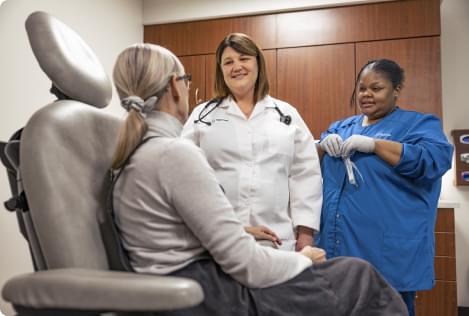Overview
Castleman disease is a group of rare disorders that involves lymph nodes that get bigger, called enlarged lymph nodes, and a wide range of symptoms. The most common form of the disorder involves a single enlarged lymph node. This lymph node is usually in the chest or neck, but it can occur in other areas of the body as well. This form of the disorder is called unicentric Castleman disease (UCD).
Multicentric Castleman disease (MCD) involves multiple regions of enlarged lymph nodes, inflammatory symptoms and problems with organ function. There are three types of MCD:
- HHV-8-associated MCD. This type is linked to human herpes virus type 8, called HHV-8, and human immunodeficiency virus (HIV).
-
Idiopathic MCD. The cause of this type is unknown. This also is called HHV-8-negative MCD.
The most serious form of this type of MCD is known as iMCD-TAFRO. This condition gets its name from the symptoms it causes.
- POEMS-associated MCD. This type is linked to another condition called POEMS syndrome. POEMS syndrome is a rare blood disorder that damages nerves and affects other parts of the body.
Sometimes, people may have 2-3 enlarged lymph nodes and mild symptoms that do not meet the diagnostic criteria for MCD. These people may have another disease, or they may have the recently described subtype of Castleman disease called oligocentric Castleman disease. This subtype is rare.
Treatment and outlook vary depending on the type of Castleman disease you have. Unicentric Castleman disease, which is the type that involves only one enlarged lymph node, can usually be successfully treated with surgery.
The best treatment for oligocentric Castleman disease, which involves a few enlarged lymph nodes and has limited symptoms, is not known but is thought to be similar to the treatment for unicentric Castleman disease.
While not all people with MCD respond to the first treatment, there are medicines that work to treat HHV-8-associated MCD and idiopathic MCD.
Symptoms
Many people with unicentric Castleman disease don't notice any signs or symptoms. The enlarged lymph node may be found during a physical exam or an imaging test for a different problem.
Some people with unicentric Castleman disease might have signs and symptoms that are more often seen in multicentric Castleman disease. These may include:
When to see a doctor
If you notice an enlarged lymph node on the side of your neck or in your underarm, collarbone or groin area, talk with your healthcare professional. Also call your care team if you have a lasting feeling of fullness in your chest or abdomen, fever, fatigue, or weight loss that you can't explain.
Causes
It's not clear what causes unicentric Castleman disease or idiopathic multicentric Castleman disease (MCD). However, HHV-8-positive MCD is known to occur in people who don't have typical function in their immune systems because of HIV or other causes.
Risk factors
Castleman disease can affect people of any age or gender. People usually are diagnosed with Castleman disease during midlife, but it can happen at any age, including during childhood.
There are no known risk factors for unicentric Castleman disease or idiopathic multicentric Castleman disease. Infection with HIV or having a condition that decreases how well the immune system works raises the risk of having HHV-8-positive multicentric Castleman disease.
Complications
People with unicentric Castleman disease (UCD) usually do well once the affected lymph node is removed, and life expectancy is usually not changed. But they are at increased risk of developing a rare autoimmune condition called paraneoplastic pemphigus. This condition can be life-threatening. Paraneoplastic pemphigus causes blisters in the mouth and on the skin that are often misdiagnosed. Though the risk of developing paraneoplastic pemphigus is low, being checked for this condition is important if you have UCD.
Idiopathic multicentric Castleman disease can rapidly get worse to involve life-threatening problems with organ function. This requires critical care with a machine that helps with breathing, called a ventilator, and treatments that help with organs function, such as dialysis and transfusions.
HHV-8-positive multicentric Castleman disease may involve life-threatening infections and organ failure. People who also have HIV/AIDS generally have worse outcomes.
Diagnosis
After reviewing your medical history and doing a detailed physical exam, your healthcare professional may recommend:
- Blood and urine tests. These help rule out other infections or diseases. These tests also can find anemia and changes in blood proteins that can be typical of Castleman disease.
- Imaging tests. These tests can find enlarged lymph nodes or an enlarged liver or spleen. A CT scan of the neck, chest, abdomen and pelvis may be used. A positron emission tomography scan, also known as a PET scan, may be used to diagnose Castleman disease. PET scans also can show whether a treatment is working.
- Lymph node biopsy. This test is essential to diagnose Castleman disease and rule out related disorders, such as lymphoma. In a biopsy, a tissue sample from an enlarged lymph node is removed and looked at in a laboratory.
Treatment
Treatment depends on the type of Castleman disease you have.
Unicentric Castleman disease
Surgery to remove the affected lymph node is the usual treatment for unicentric Castleman disease (UCD). If the lymph node is in the chest or abdomen, major surgery may be needed.
Surgery to remove the enlarged lymph node usually cures UCD. However, UCD sometimes comes back. If surgery is not possible, you may need medicines typically used for multicentric Castleman disease. If medicines don't work, radiation therapy may be an option.
More research into the treatment of oligocentric Castleman disease is needed, but treatment is usually similar to that of UCD.
You'll likely need follow-up exams, including imaging and laboratory tests, to check that the disease hasn't come back.
HHV-8-positive multicentric Castleman disease
Rituximab (Rituxan) is usually the first treatment for HHV-8-positive MCD. Rituximab is highly effective, but sometimes medicines called antivirals and chemotherapies are needed. Antiviral medicines can block the activity of HHV-8 or HIV, and chemotherapies can get rid of extra immune cells.
Idiopathic multicentric Castleman disease
Siltuximab (Sylvant) is usually the first treatment for idiopathic MCD. In the U.S., siltuximab is the only medicine approved by the Food and Drug Administration (FDA) for the treatment of idiopathic MCD. People who get better after taking siltuximab tend to have successful long-term treatment. This drug blocks the action of a protein called interleukin-6. The bodies of people who have idiopathic MCD produce too much of this protein.
People who are critically ill with idiopathic MCD often receive treatment with medicines called corticosteroids. They also may need chemotherapy. Corticosteroids such as prednisone can help control inflammation. Chemotherapy can get rid of immune cells that are causing problems.
When siltuximab doesn't work, other treatments such as rituximab (Rituxan) and sirolimus (Rapamune) may be used.
Preparing for an appointment
You may be referred to a doctor trained in treating blood disorders. This type of doctor is called a hematologist.
What you can do
- Write down the symptoms you have been experiencing and for how long.
- Write down key medical information, including other health conditions.
- Make a list of all medicines, vitamins and supplements that you're taking, including the doses.
Questions to ask your doctor
- What's the most likely cause of my symptoms?
- What kinds of tests do I need? Do they require any special preparation?
- What treatment do you recommend? Do I need surgery?
In addition to the questions that you've prepared to ask your healthcare professional, don't hesitate to ask other questions during your appointment.
What to expect from your doctor
Your healthcare team is likely to ask you a number of questions. Being ready to answer them may leave time to go over points you want to spend more time on. You may be asked:
- When did you first have symptoms?
- Have your symptoms been continuous or occasional?
- How bad are your symptoms?
- Does anything seem to improve your symptoms?
- What, if anything, appears to worsen your symptoms?
- Do you have any other health conditions, such as lymphoma, HIV/AIDS or Kaposi sarcoma?
© 1998-2026 Mayo Foundation for Medical Education and Research (MFMER). All rights reserved. Terms of Use


